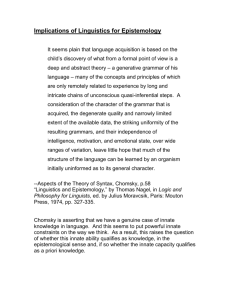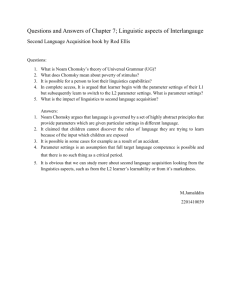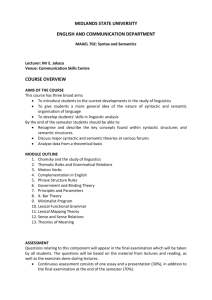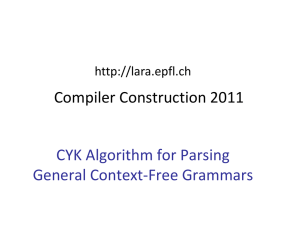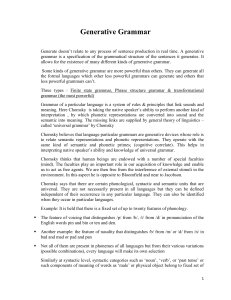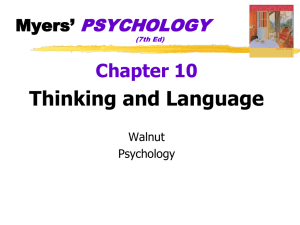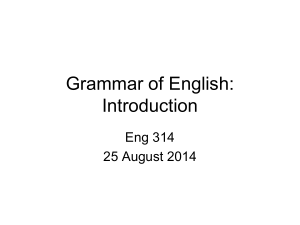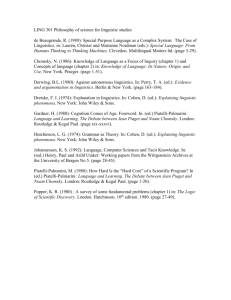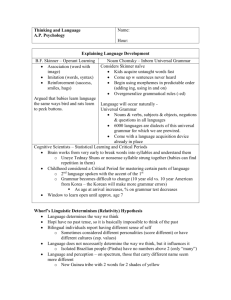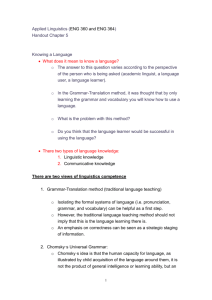Skinner on verbal behaviour file
advertisement
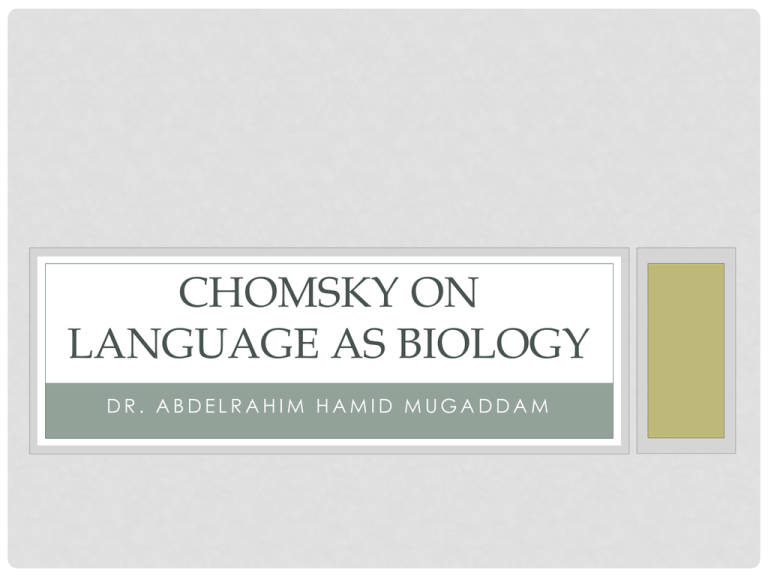
CHOMSKY ON LANGUAGE AS BIOLOGY DR. ABDELRAHIM HAMID MUGADDAM BIOGRAPHY • Other names Avram Noam Chomsky Born December 7, 1928 (age 83) Philadelphia, Pennsylvania Era 20th / 21st-century philosophy Region Western philosophy School Generative linguistics, Analytic philosophy Main interests Linguistics · Psychology Philosophy of language Philosophy of mind Politics · Ethics • Chomsky has been described as the "father of modern linguistics"[18][19] and a major figure of analytic philosophy. • ]His work has influenced fields such as computer science, mathematics, and psychology. • He is credited as the creator or co-creator of the Chomsky hierarchy, the universal grammar theory, and the Chomsky–Schützenberger theorem. • After the publication of his first books on linguistics, Chomsky became a prominent critic of the Vietnam War, and since then has continued to publish books of political criticism. • He has become well known for his critiques of U.S. foreign policy, state capitalism and the mainstream news media. • His media criticism has included Manufacturing Consent: The Political Economy of the Mass Media (1988), cowritten with Edward S. Herman, an analysis articulating the propaganda model theory for examining the media. • He describes his views as "fairly traditional anarchist ones, with origins in the Enlightenment and classical liberalism", and sometimes identifies with anarchosyndicalism and libertarian socialism. GENERATIVE GRAMMAR • The Chomskyan approach towards syntax, often termed generative grammar, studies grammar as a body of knowledge possessed by language users. • Since the 1960s, Chomsky has maintained that much of this knowledge is innate, implying that children need only learn certain parochial features of their native languages. • The innate body of linguistic knowledge is often termed universal grammar. From Chomsky's perspective, the strongest evidence for the existence of Universal Grammar is simply the fact that children successfully acquire their native languages in so little time. • He argues that there is an enormous gap between the linguistic stimuli to which children are exposed and the rich linguistic knowledge they attain (the "poverty of the stimulus" argument). The knowledge of Universal Grammar would serve to bridge that gap. • Chomsky's theories have been immensely influential within linguistics, but they have also received criticism. • One recurring criticism of the Chomskyan variety of generative grammar is that it is Anglocentric and Eurocentric, and that often linguists working in this tradition have a tendency to base claims about Universal Grammar on a very small sample of languages, sometimes just one. • Initially, the Eurocentrism was exhibited in an overemphasis on the study of English. • However, hundreds of different languages have now received at least some attention within Chomskyan linguistic analyses. • In spite of the diversity of languages that have been characterized by UG derivations, critics continue to argue that the formalisms within Chomskyan linguistics are Anglocentric and misrepresent the properties of languages that are different from English. • Chomsky's approach has been criticized as a form of linguistic imperialism. • In addition, Chomskyan linguists rely heavily on the intuitions of native speakers regarding which sentences of their languages are well-formed. • This practice has been criticized on general methodological grounds. • Some psychologists and psycholinguists, though sympathetic to Chomsky's overall program, have argued that Chomskyan linguists pay insufficient attention to experimental data from language processing, with the consequence that their theories are not psychologically plausible. • Other critics (see language learning) have questioned whether it is necessary to posit Universal Grammar to explain child language acquisition, arguing that domain-general learning mechanisms are sufficient. • Today there are many different branches of generative grammar; one can view grammatical frameworks such as head-driven phrase structure grammar, lexical functional grammar, and combinatory categorial grammar as broadly Chomskyan and generative in orientation, but with significant differences in execution. CHOMSKY'S HIERARCHY • Chomsky is famous for investigating various kinds of formal languages and whether or not they might be capable of capturing key properties of human language. • His Chomsky hierarchy partitions formal grammars into classes, or groups, with increasing expressive power, i.e., each successive class can generate a broader set of formal languages than the one before. • Interestingly, Chomsky argues that modeling some aspects of human language requires a more complex formal grammar (as measured by the Chomsky hierarchy) than modeling others. For example, while a regular language is powerful enough to model English morphology, it is not powerful enough to model English syntax. • In addition to being relevant in linguistics, the Chomsky hierarchy has also become important in computer science (especially in compiler construction and automata theory). • An alternate method of dealing with languages is based upon Formal Power series. • Formal Power series as well as the relationship between languages and semi-groups continued to occupy M. P. Schützenberger at the Sorbonne. • Formal Power Series are similar to the Taylor Series one encounters in a course on Calculus, and it is especially useful for languages where words (terminal symbols) are commutative.
